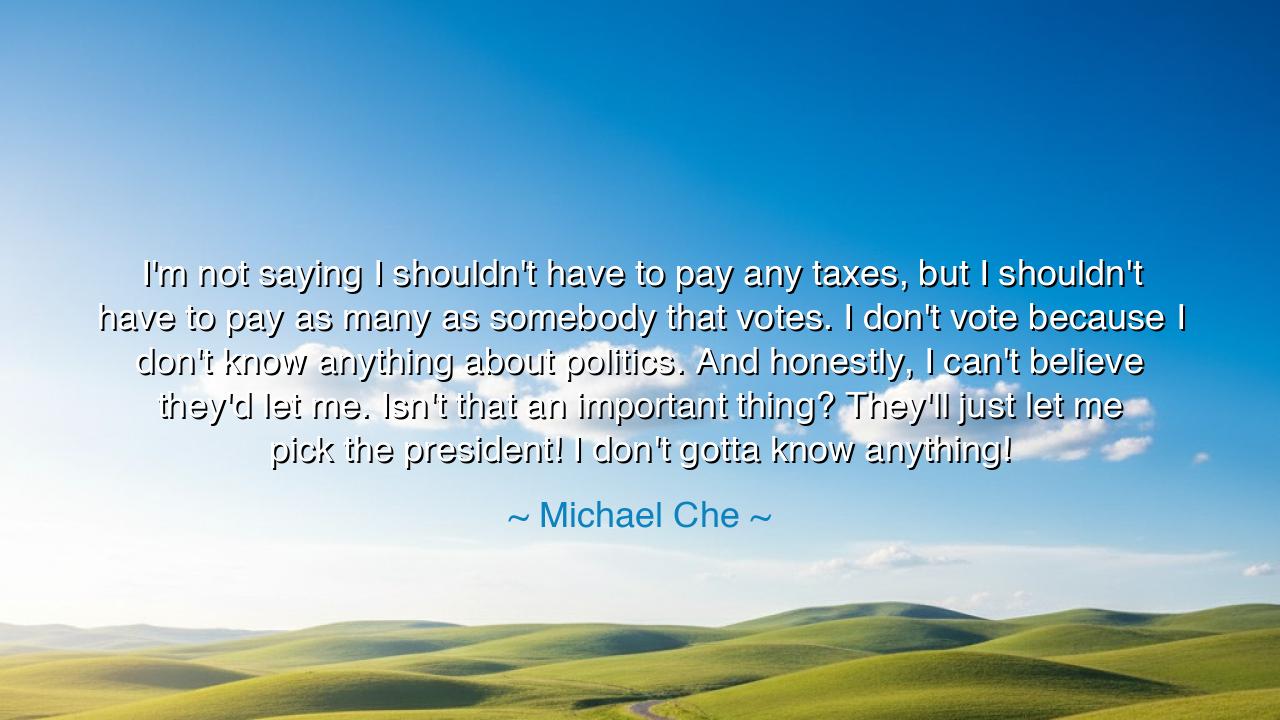
I'm not saying I shouldn't have to pay any taxes, but I
I'm not saying I shouldn't have to pay any taxes, but I shouldn't have to pay as many as somebody that votes. I don't vote because I don't know anything about politics. And honestly, I can't believe they'd let me. Isn't that an important thing? They'll just let me pick the president! I don't gotta know anything!






Hear me, O children of wisdom, for the words of Michael Che stir a deep and unsettling truth: "I'm not saying I shouldn't have to pay any taxes, but I shouldn't have to pay as many as somebody that votes. I don't vote because I don't know anything about politics. And honestly, I can't believe they'd let me. Isn't that an important thing? They'll just let me pick the president! I don't gotta know anything!" In these words, there is a recognition of the sacred duty of voting, and yet, a challenge to the very foundation of democracy itself. Che speaks of the tension between the power of the vote and the responsibility that comes with it—a balance often forgotten by those who wield their right without understanding the full weight of their choices.
What Che touches upon is the deeper truth that those who vote must not do so lightly. The vote is not a right to be taken for granted, nor a game to be played in ignorance. It is a sacred trust, a responsibility to understand the world we seek to shape, to choose wisely those who will lead us into the future. Democracy demands not only participation, but knowledge—a wisdom that comes from engaging with the ideas that shape the very fabric of our lives. Che’s words remind us that to vote without understanding is to risk the very fabric of society itself.
Consider the story of Socrates, the great philosopher of ancient Athens, who, though deeply involved in his city’s politics, chose not to engage in the democratic process of his time. Socrates was wary of those who voted without true understanding, seeing it as a dangerous folly that could lead to the downfall of the polis. He understood that democracy requires more than the mere act of voting; it requires that the people be wise, that their decisions be grounded in reason, not in ignorance or impulse. His caution echoes through time, reminding us that the strength of a nation lies not in the number of votes cast, but in the wisdom behind them.
In Rome, during the time of the Republic, citizens took their right to vote with the utmost seriousness. Before casting their ballots, they were expected to engage in debates, to study the candidates and their policies, to understand the implications of their choices on the future of their city. Voting was seen as a duty, and with it came the responsibility of knowing the issues and the people involved. Those who voted in ignorance were seen as a danger to the Republic, for their choices could easily be manipulated by rhetoric and false promises.
Thus, Che’s words carry a profound lesson for us all. The act of voting is not to be taken lightly, and it is not a privilege for the uninformed. It is a responsibility—a sacred duty that requires the wisdom to understand the consequences of our choices. Democracy flourishes when those who engage in it are committed not only to casting their ballots but to seeking the truth and understanding the world they seek to shape. To vote without understanding is to risk not only our own future but the future of all. Let us, therefore, approach the act of voting with the wisdom and discernment it truly deserves.






AAdministratorAdministrator
Welcome, honored guests. Please leave a comment, we will respond soon